Our Mission
Our mission is to expand the bee population while improving the health of honeybees and other pollinators here in New York and around the world. Our locally certified beekeepers install and manage hives on your property and use the data we collect to drive the science of pollinator health forward with scientific partners that include MIT, NASA, National Geographic and the Urban Bee Lab.


Our Reach in the New York Area
90+ residential backyard hives
170+ hives
80+ commerical property hives
Hive Programs for Commercial Properties
We offer innovative solutions that can help bring your corporate sustainability programs to life. These include the highest standards on beekeeping, as well as developed workshops and programs that will engage your community—employees, guests, tenants, community leaders and the public—in your sustainability work.
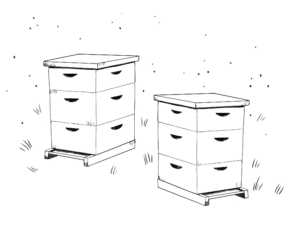
Commercial Services
Beekeeping for Your Backyard or Garden
If you’d like to save bees, build a healthier environment, pollinate your garden, and have your own honey harvest, then our residential service is perfect for you! We offer turnkey beekeeping, honey harvesting, and DNA analysis designed for homeowners in a wide range of environments. Regardless of the size of your property—whether you garden on a balcony, or have acres of land, we can set up and tend a hive—or several hives—for you.

Residential Services
Pre-recorded and live hive tours
Experience a guided tour as one of our bee experts takes you on a walk-through of your hive visits and inspections. Get a glimpse of the busy life of bees and learn more on how to keep tenants engaged with their local environment. Live tours are available for up to 20 participants.
Meet an expert beekeeper
Participate in a beekeeper-led webinar and Q&A session. This virtual event is a great opportunity to learn about your bees through the lens of a beekeeper. We’ll discuss the data collected from your beehives, why bees matter, and what it's like to take care of your bees.
Virtual keynotes
Gain insight into the world of bees with our Chief Science Officer and Founder, Dr. Noah Wilson-Rich. Noah's knowledge of honeybee health and his passion for bee research will leave your audience spellbound, and with a wealth of new insight about our natural world. Our virtual keynote package includes signed copies of The Bee: A Natural History.
We also offer free and open online programs, such as live meetings with beekeepers and educational webinars.
How Professional Beekeeping Works
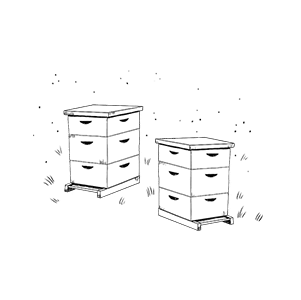
Installation
We help you choose an ideal location to establish one or more beehives at your home or workplace.
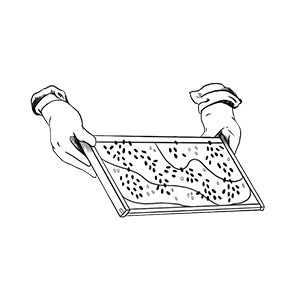
Maintenance
Our impassioned and experienced beekeepers service your beehives once a month, providing high-quality care and detailed reports.

Harvesting
You keep 100% of the raw honey produced. We’ll handle the rest— small batch extraction and bottling with personalized labels.
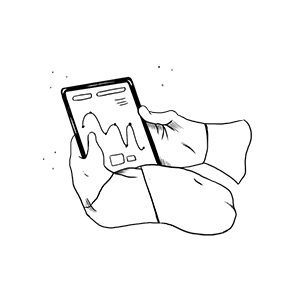
Research
At every visit, we collect data and share it with our research partners to advance the science of beekeeping and improve the health of pollinators worldwide.
Safe
Our honeybees, Apis mellifera ligustica, are the most docile species of honeybees, making our hives extremely safe and the instance of stings very unlikely.
Secure
Our beekeepers have extensive experience working in densely populated areas in and around New York City and its suburbs, and are experts at safe hive placement on rooftops, balconies, and ground-level gardens.
Insured
Our beehives and beekeepers are fully insured for personal liability and damage. We can provide you with a certificate of insurance (COI) if needed.

Beekeeping Laws in the New York Area
While beekeeping is legal in the states of Connecticut, New Jersey, and New York, some municipalities may still ban beekeeping. Check your local municipal government for clarification. Since 2010, beekeeping has been legal in New York City.
Connecticut beekeepers must register with the State Entomologist.
New Jersey beekeepers must register with their state’s Department of Agriculture, and to reduce conflicts with neighbors, must abide by management best practices governing the number and placement of hives.
New York State beekeepers must register with the Department of Agriculture, and NYC beekeepers must register with the city’s Department of Health and Mental Hygiene.
For more information on local beekeeping ordinances, visit your state’s beekeeping organization: ctbees.org, njbeekeepers.org, eshpa.org (Empire State Honey Producers Association).
You can be assured that our beekeepers will abide by all local ordinances when it comes to hive placement and care. All of our beekeepers are licensed to use pesticides and are certified for safe roof-top work.
New York City Service Area
We service hives in the following counties in New York City area:
Suffolk County
Kings County
Queens County
New York County
Putnam County*
Bronx County
Westchester County
*Service area limited. Please call to confirm coverage of your specific county.
What's Included
- Site Evaluation
- Hand-crafted, all-natural beehive equipment installed onsite
- A colony of docile honey bees (Apis mellifera ligustica)
- Monthly maintenance visits and follow up reports
- Advanced scheduling so you can alert your team
- Full-time customer service team available by phone or email
- Raw honey, harvested and bottled just for you
- Replacement colonies provided at no cost
- Fully insured professional service
About Local Honey
Honey production varies from colony to colony, depending on the strength of the Queen, the health of the hive and the availability of nourishment. New colonies tend to produce less honey than established ones. When there is a surplus of honey, we will harvest and jar it for you.
The composition and flavor of honey varies from hive to hive as well, depending on the floral species available to pollinate. This means that honey from your hive will have a unique profile. Tasting it, you are tasting the composite of all the flowers your bees have visited!
In our studies of honey DNA, we’ve found that honey from urban hives includes a much wider range of species—as much as eight times more than honey from rural and suburban hives!
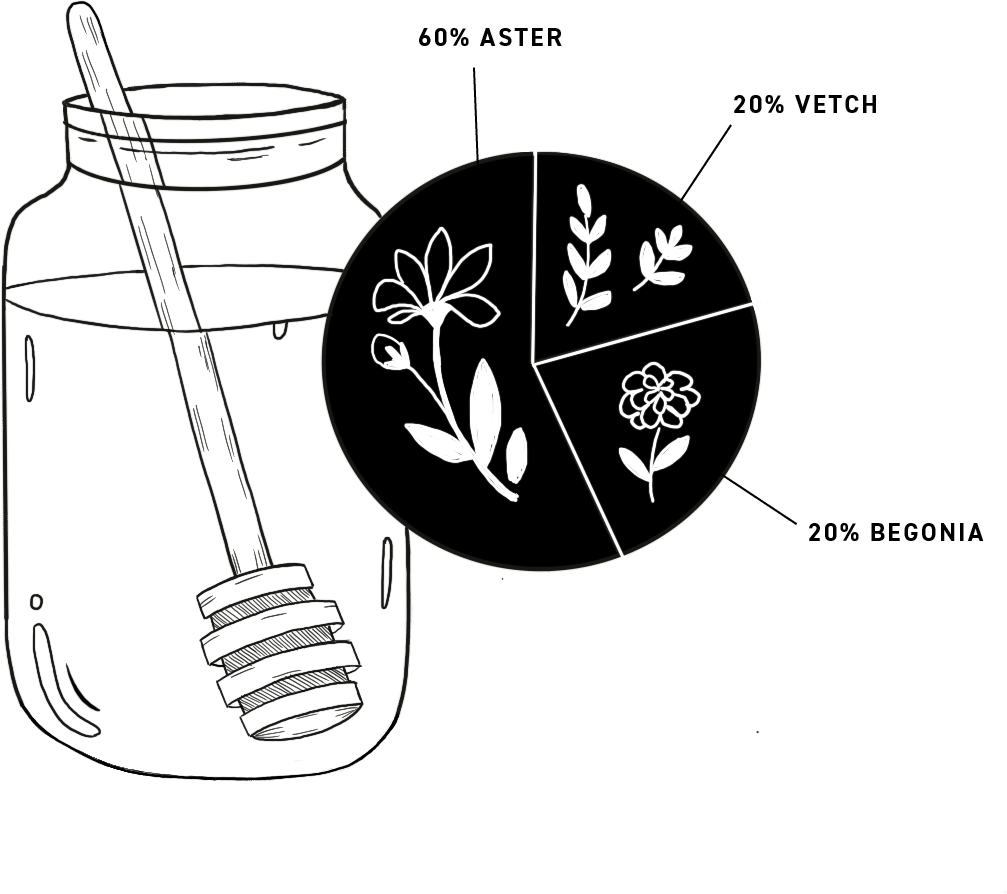
HoneyDNA
We pioneered the process of identifying the exact percentage of various pollen species found in honey through advanced genomic sequencing. Understanding where bees foraged reveals which plants best feed pollinators in the local environment.
Already Have a Hive?
Join our Citizen Scientist movement! Here are some ways you can participate:
- Plant more pollinator habitat on your property
- Use bee-safe pesticide alternatives
- Get involved in local and national lobbying
- Submit your honey for HoneyDNA
You can also post your data to bee Citizen Science programs like iNaturalist and Beecology Project.
We gladly share the learning from our research and our best practices with everyone.
To learn more about the findings of our research work, visit our White Papers Page.
Unique Challenges and Opportunities to Beekeeping in New York
Weather is often a challenge for beekeeping in the New York area, with extremes of both heat and cold possible through the course of the year that can put added stress on hives.
Setting up and tending hives on skyscraper roofs poses a set of unique challenges to our NYC beekeepers. Building access, security clearance, and transportation of heavy beekeeping equipment up to roofs can be difficult, especially for beekeepers working alone. Installing hives on roofs requires building-specific knowledge of seasonal sun exposure—bees wake early and need morning sun.
“High winds on rooftops are one of our biggest issues.” says Best Bees beekeeper Brenda Alverez, “We have to find places where the hives are sheltered as much as possible from up and down drafts, as well as persistent crosswind, and then secure them with something heavy just to be sure. We’ve found that cinder blocks are the simplest and most effective solution.”
Access to forage in densely built-up areas, such as downtown and midtown Manhattan, can also be an issue. While bees can fly several miles for water forage, most of our clients, such as L’Oreal and J.P Morgan Chase, set up pollinator gardens and water sources near their roof-top hives.
One advantage to urban beekeeping in New York City is the reduced number of predators, and competitors found in largely man-made environments. The lack of human contact with nature in these environments can be an advantage for our beekeepers and our clients—workers and residents in large buildings are pleasantly surprised to find they have bees for company and are to question beekeepers about everything bee-related.
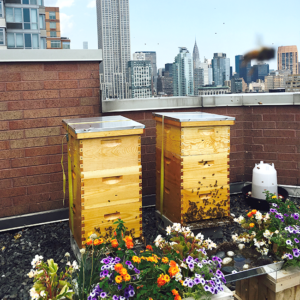
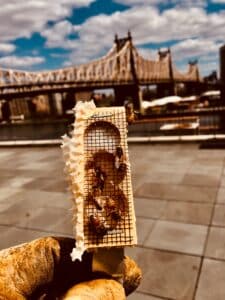
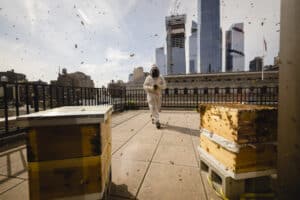
Frequently Asked Questions
We install and maintain honeybee hives on your property. Our expert beekeepers monitor the health of your bees and perform a variety of tasks throughout the year to help them thrive. At each visit, we also capture a range of metrics and share the data with renowned research partners to help the scientific community better understand the plight of pollinators. Towards the end of the season, we extract the honey and jar it for you.
About once a month in the New York area. If your bees are distressed and need extra support, supplemental visits are included. We coordinate each visit in advance and send a summary report afterward.
Only a few square feet! A beehive takes up as little as 2’ x 2’ x 3’. Our beekeepers need a few feet around the hive to access it, and the bees’ flight path will need to be unrestricted.
In the New York area, we typically install hives when all threats of winter have passed, which is usually in April and May. Installations
We fully guarantee the health of our bees and queens. If a colony dies, we’ll replace it with a healthy one from our own stock at no additional cost. While we hope each of our hives will thrive for years to come, the reality is that pollinators are still dying at an unprecedented rate. In places like New York, where winters can be severe, we can lose approximately 40% of our hives annually, but this year, because of the diligent work of our beekeepers, we lost only 20% of New York area hives.
Our headquarters is staffed full time and available Monday through Friday during work hours by phone or email to answer any questions. When a colony requires extra attention, additional visits are made at no cost to you.
Yes, we provide a range of event support packages for our commercial clients. See Hive Programs for Commercial Customers for details.
Green roofs earn credits toward a building’s LEED (Leadership in Energy and Environmental Design) certification. Green roofs provide vegetation for water control, wildlife habitat, and better urban air quality. Honeybees can help maintain the green roofs that are becoming more common in big cities and thus contribute to a building’s LEED rating.
We service hives in the following counties: Suffolk, Kings, Queens, New York, Putnam, Bronx and Westchester. *Service area is limited.
We handle visit scheduling for you. We’ll contact you at least 72 hours in advance via email.

